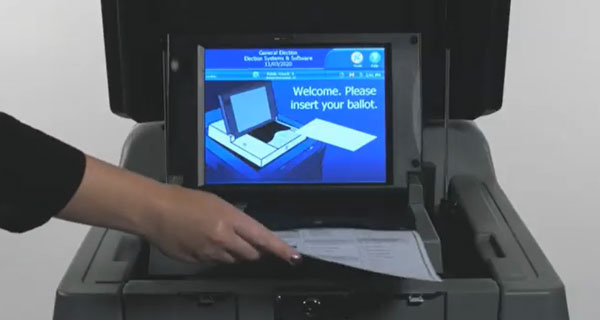
This article is a part of Every Voice, Every Vote, a collaborative project managed by the Lenfest Institute for Journalism with lead support from the William Penn Foundation, and additional funding from Lenfest, Comcast NBC Universal, the John S. and James L. Knight Foundation, Henry L. Kimelman Family Foundation, Judy and Peter Leone, Arctos Foundation, Wyncote Foundation, 25th Century Foundation and Dolfinger-McMahon Foundation.
With two weeks left until Election Day on Nov. 5, election security continues to concern some voters.
While that’s a national issue, its effectiveness can be influenced by local-level protections. Several election-specific technologies and monitoring procedures play a crucial role in safeguarding the democratic process in Allegheny County. And on top of years-old security methods, it’s cropping up with new ways to help.
For example, this year in Allegheny County, the federal government is providing poll workers additional training to de-escalate possible violence and election interference at the polls.
To some, that may seem extreme, but with Pennsylvania being a key swing state, the growing threats of violence against election officials can potentially disrupt voting operations. This, coupled with the possibility of foreign interference or voter fraud, can undermine election integrity.
So, despite the director of the US Cybersecurity and Infrastructure Security Agency recently saying the country’s election infrastructure is more secure than ever, not all Americans are convinced.
A majority of Americans, 58%, say they are concerned that voter fraud will occur this year, and about 66% say they are concerned that foreign countries will interfere with this year’s election, according to a recent Marist poll in collaboration with NPR and PBS News.
In Allegheny County, election officials tout a mix of secure updates to modern software and relying on old-school tech like flash drives, to shield from election interference and ease public concern.
Here’s an inside look at how Allegheny County officials use security procedures and election-specific tech to keep votes in Pittsburgh and the surrounding region secure.
PA’s mandatory paper trail, combined with an internet lockdown
The process begins before Election Day with Pennsylvania’s past decision to regulate what types of voting machines counties have access to.
Before 2020, Pennsylvania used a variety of voting machines, including some that required paper ballots and others that only recorded votes electronically, called direct recording electronic machines. After Pennsylvania settled a lawsuit in 2018, which claimed the commonwealth’s voting machines were susceptible to hacking, it was forced to update its voting systems across all countries to include paper ballots.
Residents in Allegheny County are required to fill out a paper ballot and then insert it into a DS 200, a machine that scans the ballots and records the data. Paper ballots, as opposed to electronic ones, create a transparent, physical record that can be audited after the election.

Out of the several ballot-scanning machines approved for use in Pennsylvania, the DS 200 is used in 36 out of 67 counties, according to the nonprofit Verified Voting. Before the election, the scanners are kept in secure facilities that can only be accessed by authorized election personnel, according to the Pennsylvania Department of State website.
Designed by American-owned voting technology company ES&S, the DS 200 does not connect to the internet and has additional security features, like audit logs and encryption capabilities, to prevent election interference.
After the final votes are cast on Election Day, USB flash drives are used to transfer voting data from the DS 200 scanners to secure computers connected to the county’s official network, which collects and tallies the votes.
The computers are locked down to perform only essential functions and will not accept unauthorized flash drives, according to the Allegheny County website. This setup prevents internet access, reducing a computer’s vulnerability to hackers and potential exposure to malware or viruses from unapproved flash drives.
Software designed by ES&S, called ElectionWare, is installed on the computers and includes security features like a record of all user actions in the voting system’s audit log and a unique encryption key for each election. Election officials can review each action taken within the voting system and the encryption key makes voting data unreadable to unauthorized users.
By the end of Election Day, the county has a physical record of votes from the paper ballots and a digital record of votes tabulated by the DS 200 scanners. Having both is good for security because any potential discrepancies between the physical and digital records of votes can be investigated.
The security lead-in and follow-up to Election Day protocols
Keeping votes secure requires months of pre-election preparation and multiple post-election audits.
That falls under the jurisdiction of the Allegheny County Elections Division and the Department of Information Technology (DIT).
Detailed information on security protocols is not publicly available to protect election security, but the county does provide some general information about the testing and security measures completed during the election cycle.
Before Election Day:
- The county’s Elections Division conducts logic and accuracy testing of voting system equipment several weeks before in-person voting. The Elections Division uses test ballots to evaluate the voting systems’ ability to produce accurate results.
- Approximately two weeks before the election, DIT conducts regional laptop testing to ensure the computers used during the election can connect to the county’s network. Test USB flash drives are also used to submit test data to the computers, with DIT staff verifying the accuracy of the transmitted results.
- The county conducts Air Gap Tests, a network security measure performed the day before and two days after the election, to ensure the voting system is isolated from unsecured networks, like the internet. These tests are contracted out to a security agency, and classified reports are generated to identify potential vulnerabilities in the system.
After Election Day:
- DIT conducts a post-election verification by comparing the voting data transmitted on election night to the voting data on the scanners’ backup USB flash drives. Reports are created from ElectionWare to confirm that vote totals per precinct match the totals from the scanners on election night.
- The county conducts two post-election audits, including a 2% statistical recount of all ballots and a statewide risk-limiting audit (RLA). The RLA uses statistical methods to compare a random sample of paper ballots against the reported totals.
- The Elections Division contracts with a private auditing agency to conduct parallel testing, an independent test of a random precinct’s voting equipment after the election. The auditor then provides documentation of the test to DIT.
All of these efforts play a role in maintaining public trust in not only preventing malicious actors from accessing Allegheny County’s voting system, but also ensuring that each vote is counted accurately.
Help from PA officials trickles down to Allegheny County, too
Despite increased security measures around Pennsylvania’s voting system, conspiracy theories around election integrity persist, raising concerns about potential violence during this election.
For example, at a town hall event in Pennsylvania last week, Elon Musk repeated false conspiracy theories that voting machines rig elections. Musk specifically mentioned Dominion Voting Systems, which faced accusations of vote-rigging after the 2020 election. Fox News settled a $787 million defamation lawsuit with the company last year.
Musk also falsely claimed Dominion machines were being used in Philadelphia, but a statement from the company later clarified that it does not serve the area and audits of paper ballots have consistently shown that Dominion machines produced accurate results during the 2020 election.
So, there’s an added burden on counties to step up and prove the conspiracies wrong.
With all eyes on the commonwealth ahead of November, Governor Josh Shapiro established the Pennsylvania Election Threats Task Force in February to mitigate threats to the election process by establishing clear communication between public agencies.
The Task Force, led by Secretary of the Commonwealth Al Schmidt, includes federal, state and local law enforcement and election administration officials. The group meets monthly and primarily works to coordinate responses to potential threats levied against polling places and workers.
For Allegheny County, that means even more insights on how to keep its election tech up-to-date before November, and assistance if things go wrong.
“In recent years, we’ve seen bad-faith actors … spreading lies and baseless conspiracy theories, and attempting to delegitimize our safe, secure and accurate elections,” said Schmidt in a news release earlier this year. “This task force has been working together to develop and coordinate plans to combat this dangerous misinformation and continue providing all eligible voters with accurate, trusted election information.”







